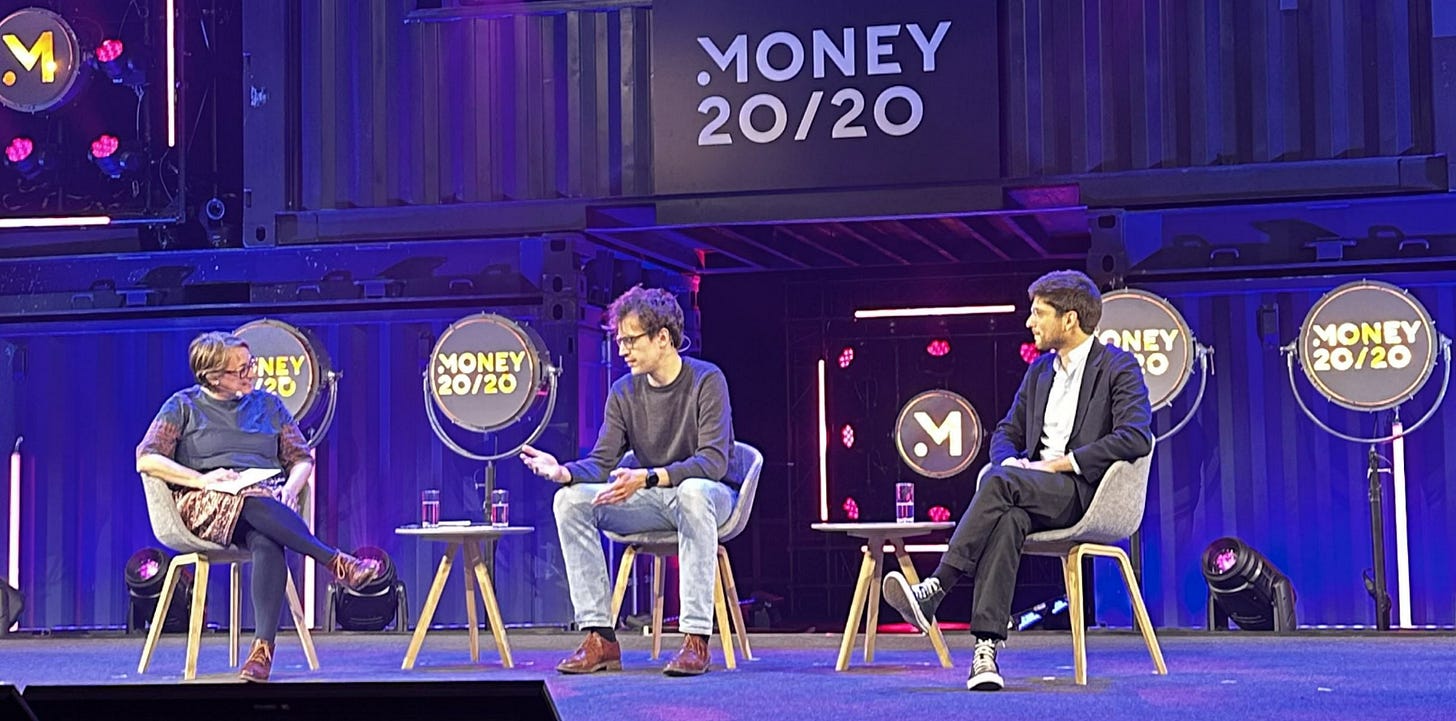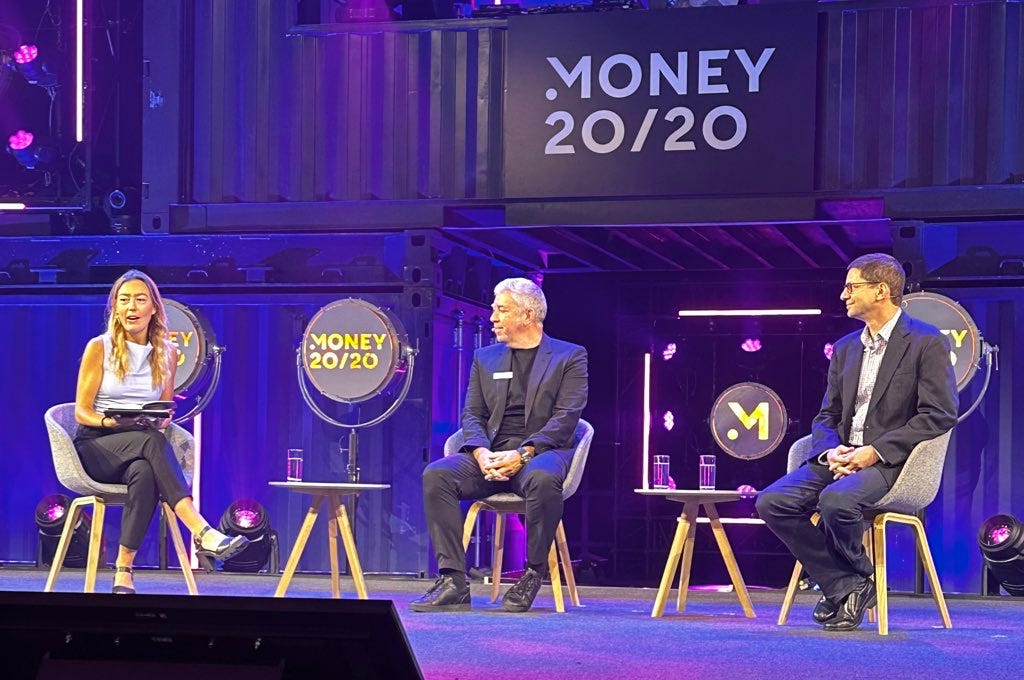Money 2020 Europe - round up
Learning from experts on how to implement AI in financial services
The theme of this year’s Money 20/20 Europe in Amsterdam was Human X Machine.
This theme recognised the wave of AI that has permeated the tech world since ChatGPT and LLMs (Large Language Models) entered the public consciousness 18 months ago. Money 20/20’s own pre-event blurb extravagantly put it:
We must prepare to witness a metamorphosis, where the interplay of consumer and business interactions ascend to new heights, redefining not only what we experience but how we experience it.
In this age of transformation, efficiency will increase in ways we can’t comprehend and there’s no portion of our ecosystem that will remain untouched by the collaboration between humans and machines.
With this in mind, I spent some time at Money 20/20 listening to keynote talks on AI seeking to better understand how it can benefit the financial services sector.
First up was Europe’s challenger to Open AI, Mistral AI. The company was only established in mid-2023, yet as of this week, it has raised a total of $1bn and now has a valuation of $6bn. Arthur Mensch, CEO of Mistral AI, was joined on-stage by Jonathan Userovici, General Partner, Headline (VC), and Ingrid Lunden, International Editor, at TechCrunch.
Arthur Mensch explained that despite Mistral AI being a French company, most of its business currently comes from American clients. So far, American companies have tended to be more mature in their implementation of AI. Yet being in Paris comes with some advantages. It gives the company access to a vast European talent pool, drawing experts from both academia and big tech.
For clients in the financial services sector, Mistral AI can be deployed in a virtual cloud or on-site within a customer’s own infrastructure. This can be very popular with banks, who may not feel comfortable with a fully cloud-based approach with their vendors.
Mistral AI offers a startup enablement programme alongside its VC partners. Early-stage companies may receive credits to use Mistral AI’s models and platforms as part of this programme. This approach is similar to how cloud service organisations like AWS (Amazon Web Services) have supported startups with operating credit, especially in their early days.
The next session, moderated by freelance reporter Amy O’Brien, featured Kevin Levitt, Director of Financial Services at Nvidia, and Patrice Amman, EMEA Financial Services Business Lead at Microsoft.
Kevin Levitt mentioned that Nvidia is communicating with the broad technology industry, an ongoing paradigm shift. Computing has been about retrieving data, but now, with LLMs and related technology, we are moving from a world of retrieval to generation. Nvidia CEO Jensen Huang has said AI is leading a new industrial revolution.
Some Nvidia customers operate with hundreds of AI use cases, including extracting relevant information from documentation to better understand risk and deliver hyper-personalisation. One example cited from the payments world was Klarna, which has more than 90% of employees using AI on a day-to-day basis. It is expected that across trading, banking, and payments, there will be thousands of live use cases soon.
Microsoft’s Patrice Amman noted some of the major risks businesses face when it comes to AI – for instance, data privacy risk, leakage risk, and bias risk within AI models. Microsoft has developed a responsible AI framework that it incorporates across all its platforms - for instance Microsoft 365 or Azure. It was emphasized that it’s important to make security a key factor when deploying AI within a business, add controls, and keep it consistent across all areas
The overall message was clear: organisations must invest in AI to stay competitive. If they don’t, their competitors certainly will. Companies that invest in AI will be able to provide an enhanced customer experience, so organisations need to stay with the trend and find how AI can add value to their customers.
In addition to understanding the latest from experts in AI. It was interesting to listen to Javier Perez in conversation with Fintech Brainfood writer Simon Taylor. The topic was investing in the future of payments. Javier Perez is a co-founder and Managing Partner of Global Paytech Ventures and the former CEO of Mastercard Europe. Javier highlighted some of his key factors to look for when evaluating a payments investment opportunity:
Is it seamless?
Is it integrated?
Is it instant?
Is it secure?
Is it cheap?
Does it add value?
He also advised Fintech founders to look beyond just money when raising funds. Domain area expertise can also be vitally important. An investor who doesn’t understand the business area may become impatient if obtaining licenses to operate takes longer than expected. However, someone with deep knowledge of a specific domain may be more tolerant if timelines extend beyond expectations. Also domain experts may be able to aid in resolving any issues that may surface.
Lastly, Open Banking as a payment method, or should we say Pay by Bank, was a hot topic at Money 20/20. Various panels discussed the challenges and trends in this area.
One session that caught my eye was a discussion titled “Can I Pay for My Coffee with It? Making Pay by Bank Work?”, which looked at the challenge of using Pay by Bank on a day-to-day basis. This panel was moderated by featured Brian Dammeir, Head of Europe, at Plaid, Emma Steeley, CEO of Aro, and Ian Morrin, Head of Payments & Platforms at Tink.
The panel agreed that while Pay by Bank offers significant cost savings for merchants. But consumers in Western markets are still largely unfamiliar with it. To drive adoption, there is a need to establish industry standards, and to enhance consumer safeguards against fraud. Also, merchants may need to provide incentives to alter consumer behaviour if they are to move from card to Pay by Bank.

Overall, Money 20/20 Europe was a valuable event and a must-attend for anyone interested in payments and the wider fintech ecosystem. As well as many engaging keynote speakers and panels, there were plenty of opportunities to network and talk with start-ups and industry veterans alike – either at the RAI Convention Centre itself or at the various evening events.








